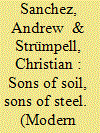| Srl | Item |
| 1 |
ID:
141074


|
|
|
|
|
| Summary/Abstract |
With reference to original ethnographic and historical research on India, the papers collected in this forum suggest conceptual refinements that might re-centre the study of class in regional scholarship. Through discussions of class politics in industrial, construction and agricultural contexts, the authors interrogate the conceptual oppositions between stably employed fordist labour forces and the ‘working poor’ that have often constrained ethnographic and historical analyses of India's working classes. Inspired by Marxist historiography, this forum engages with the historically contingent emergence of Indian working classes through different types of labour, gender and ethnic struggles, and considers the complex political boundaries that are produced by such processes.
|
|
|
|
|
|
|
|
|
|
|
|
|
|
|
|
| 2 |
ID:
141076


|
|
|
|
|
| Summary/Abstract |
Inspired by E. P. Thompson's modelling of class as the contingent outcome of historical processes, this paper explores how autochthony and descent came to inform the boundaries of industrial workforces in the Indian steel towns of Jamshedpur and Rourkela. We suggest that if class is a historical object, then it relates to other forms of power and identity in ways that question the use of rigid analytic typologies. In the private sector Tata company town of Jamshedpur, an industrial working class was constructed during the late colonial period from labour migrants, whose employment became heritable within families. In the public sector Rourkela Steel Plant, founded in the mid-twentieth century, the politics of ethno regionalism coincided with state development policy to inform employment reservation for autochthons. Through a historical analysis of urbanization, migration and employment policy, we consider how elite workforces that bound themselves according to the principles of autochthony and descent were formed in the social laboratories of India's steel towns. We suggest that such processes demand a class concept that engages more subtly with the work of E. P. Thompson.
|
|
|
|
|
|
|
|
|
|
|
|
|
|
|
|